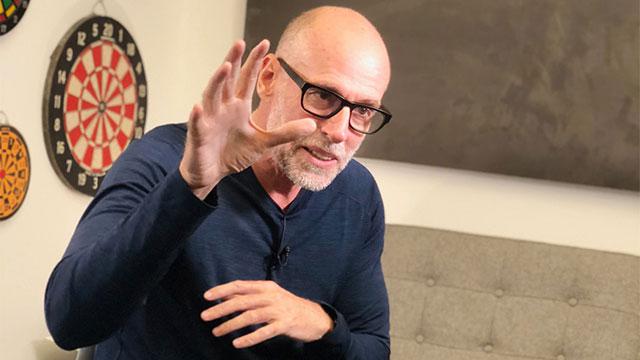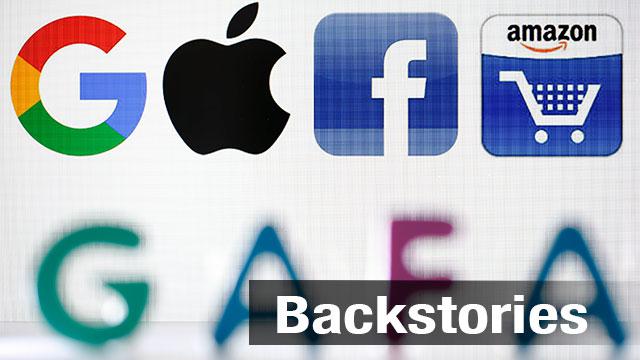Quitting Amazon, Apple, Facebook, Google and Microsoft
Daniel Oberhaus lives in the trendy neighborhood of Bushwick in Brooklyn. Two years out of college, he works as a writer for a popular digital media company and shares his apartment with two adorable cats. These days, to keep his beloved felines comfortable, he walks for more than 10 minutes carrying a heavy box of cat litter weighing over 10 kg. This used to be done with just one click on Amazon.
Oberhaus says he stopped using Amazon, Apple, Facebook, Google and Microsoft last spring. This is when it was revealed that Facebook mishandled the personal data of millions of users during the 2016 US presidential campaign and beyond. Oberhaus got upset and quit Facebook first, then decided to stop using the services offered by the tech giants to see what would happen.
"After the Cambridge Analytica scandal, I was uncomfortable giving my data to a company that was so willing to sell it," explains Oberhaus. "For companies like Google and Amazon, I was mostly concerned about how much influence they had in my life. Google in particular knows everything about me." He continues, "Nothing in life is free, so I was kind of curious to know what the real hidden cost was of using these services."
Oberhaus says quitting Google was most difficult because his work relies heavily on Google’s products and services. "So far, I’ve been happy. I’ve learned a lot in the process," he says with a smile. "It’s totally possible to live your life normally without these services. So, there is a choice."

"The big four" have reshaped the markets globally
GAFA have been leading the American economy since the 2008 financial crisis. These giants, with the exception of Apple, were all founded within the last 20 to 25 years. Consumers have been mesmerized with their innovative products and services, and have enthusiastically adopted them.
Thanks to GAFA, the Dow Jones Industrial Average hit an all-time high in October 2018. This came after Apple and Amazon made history by becoming the first public companies to be worth US$1 trillion. At that time, their combined values would have been about half the size of Japan’s economy.
However, New York stock prices nosedived shortly thereafter. Last December, the Dow Jones Industrial Average and S&P 500 plunged to the year’s lowest level, posting their worst December since 1931 and the Great Depression.
Last October, I spoke to Scott Galloway, the author of "The Four: The Hidden DNA of Amazon, Apple, Facebook, and Google." Galloway thoroughly analyzed the four giants and explained how people should co-exist with them.
'7It seems as if those companies have gone well beyond the natural point of being broken up," observes Galloway. "Every company has reshaped the markets pretty much globally.''
He continues, ''What these companies have in common is that they have suspended the natural order. And that is, they age in reverse.''
''Whereas typical manufacturing or CPG companies, whether it’s a Shiseido or a Toyota,...you take the cap off of a Shiseido moisturizer, it loses almost all of its value,'' he says.
''If you and I were in a boxing match, and you had 97 percent oxygen and I had 85 percent oxygen, you don’t need to be a better boxer, you just need to dance around the ring and eventually I will collapse.''

No one can thrive outside of their "ecosystems"
Japanese people tend to believe new startups are mushrooming in the US and spawning novel products and services one after another.
Galloway disagrees.
''If you watch business media, you would believe that we’re living in an era of incredible innovation and startups," he says, "but the data tell a different story.''
''In the US, new business formation -- that is, the number of new businesses formed every day -- has been cut in half in the last 40 years.''
''When Jimmy Carter was President, there were more businesses being formed,'' Galloway continues.
''And I believe one of the components is that, there’s a general consensus that every entrepreneur needs to not compete with Amazon, Apple, Facebook, and Google, but somehow set itself up to be acquired.''
I checked his claim, and to my surprise, found that he was right. When GAFA companies see startups with great potential, they snatch them up with massive amounts of money. When acquisitions fail, the behemoths just look for another company to prey on.
These practices have resulted in fewer listed companies in the US, as acquisitions are encouraging smaller rivals to get cash quickly rather than aim for IPOs.
GAFA companies are no longer just innovators. They are also powerful investors, and platforms with massive amounts of user's personal data. No one can thrive outside of their "ecosystems."
San Francisco is known as the hub of a vast number of startups. I met Spencer Shulem, who founded an app business at the age of 19, in the downtown Financial District. Shulem, now 23, says his life management app, WeDo, is currently used by 800 schools across the world.
Shulem agrees with Galloway's view that the key problem of GAFA is that they dominate "ecosystems" and "data."
I asked him whether GAFA have grown too big, hampering the growth of the economy as a whole.
"It’s difficult to answer that question because we have a product that lives in an ecosystem of companies that we will eventually compete against, or are already competing against," says Shulem. "You don’t want to bite the hand that feeds you. They have a platform that's a great ecosystem," he continues. "I'm able to grow because of their skill, because of their growth."
Shulem is a very well-mannered and likable young man. He chooses his words carefully.
"There are a lot of rules that all marketplaces have. This is the first time we have a multi-billion dollar market with rules set solely by the companies themselves. And it's not my place to [complain] if I don’t agree with them."
"One of the issues we have isn’t so much of a monopoly around wealth," explains Shulem. "[It] very much is the access I have to your data."
I ask Shulem what the term American Dream means to him. Does it mean to become a millionaire?
Shulem bursts into laughter. "That’s a good question!"
Again, speaking carefully, he replies, "I think the American Dream has always stayed true to just freedom, like freedom of choice. Like freedom to start a business."
He continues, "[A] lot of immigrants that come here pursuing the American Dream are coming from a country where their businesses they wanted to start could never been built."
"[The question] for me, and I think for this generation is, 'Do I have freedom to do what I want to do? Do I have a choice? Do I have options?' And as long as that exists well enough, I think that’s the American Dream that I grew up in and hopefully it’ll continue down the path."

What kind of rules are necessary?
My conversation with Galloway goes on to discuss ways to regulate GAFA.
''[The] problem is, as a society, are we comfortable with an increasingly small number of companies controlling a larger part of the economy and the spoils?'' asks Galloway.
''I think breaking them up into smaller companies would unlock a lot of innovation, unlock a lot of shareholder value, more mergers and acquisitions, more VC-backed companies, more employment, broader tax base,''he says.
The Japanese government, too, has begun discussions on how to manage the data economy. The environment in which GAFA operate may change rapidly in 2019 both on national and individual levels. More comprehensive regulations on these digital giants could take shape in 2020.
Galloway says GAFA have not only made the American Dream come true, but also changed fundamental quality.
''The American Dream used to be to create millions of millionaires," reminisces Galloway. "If you played by the rules, you went to school, you were a good person, you could be a millionaire.''
''Now, it appears fewer and fewer companies aggregate more and more power. We’ve decided that collectively, our goal is to produce the first trillionaire.''
''I would argue that’s not good for our society. That we need to return to a viewpoint of creating millions of households worth millions of dollars.''
GAFA have made our lives far more comfortable, but they also have access to our most personal information.
Will they remain our saviors? I contemplated the question over and over as I watched people passing by on the streets of New York City, their smartphones in hand.

